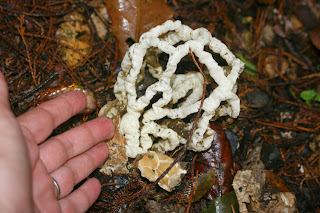 |
| L to R: Susan and Gary Winters, Lynda & Larry Bennett, Arendje and Allan Whidden |
This time, however, rather than focusing on the birds and the trees as much as we did last week, I paid more attention to the patterns in the undergrowth.
We had noticed a few mushrooms the first time around, but since the recent rain we've been having even more have popped up:
According to the Encyclopedia of New Zealand:
" Mushrooms are the spore-producing structures of some fungi. A mushroom consists of a stalk and a cap, and in most species the spores are formed on gills. When ripe, the spores fall downwards and are carried away from the mushroom on air currents. A spore that lands on a moist surface with nutrients can form a new fungal colony, but must mate with another colony of the same species before a new mushroom can be produced."
Edible or poisonous?
Some New Zealand fungi are edible, while others are unpalatable or poisonous. A few are deadly poisonous and can be easily confused with edible ones. There is no general rule to distinguish them, and tasting is never recommended when searching for edible fungi. Correct identification is essential.
Suffice it to say, we will NOT be eating any of the mushrooms we find, or any of the other forest plant life which is incredibly diverse here - especially not this very strange thing we were not sure what to think of:
Or this:
Another common sight in the forest here, as in most places, is lichen.
According to Hidden Forest:
"Lichens are made up of two, and some times three, different organisms from three different Kingdoms, which form a symbiotic relationship with each other for their mutual survival.
The dominant member is a ascomycetous fungus (Kingdom Fungi), which is capable of making it's own food. The fungus forms the visible portion of lichen inside of which, and protected by them, are cells of an algae (kingdom Protista) or some times cyanobacteria (Kingdom Monera), once known as blue-green algae. Some lichen can consist of all three organisms at once.
The algae provide nutrients, as they contain the pigment chlorophyll, which it uses during photosynthesis to produce carbohydrates the same way as green plants do. Thus the fungus obtains nutrients from the algae, the fungal tissue in turn provides shelter for the algae allowing it to grow in harsh conditions such as rock surfaces where it would otherwise be destroyed."
Wouldn't it be nice if we human beings could be more like a lichen? Rather that seeing those who are different from us as outsiders to be feared, ridiculed or despised, why can't we find better ways to partner with each other for our mutual benefit?
"And if a stranger sojourn with thee in your land, ye shall not vex him. But the stranger that dwelleth with you shall be unto you as one born among you, and thou shalt love him as thyself; for ye were strangers in the land of Egypt; I am the Lord your God:" (Lev 19:24)
"Lichens are made up of two, and some times three, different organisms from three different Kingdoms, which form a symbiotic relationship with each other for their mutual survival.
The dominant member is a ascomycetous fungus (Kingdom Fungi), which is capable of making it's own food. The fungus forms the visible portion of lichen inside of which, and protected by them, are cells of an algae (kingdom Protista) or some times cyanobacteria (Kingdom Monera), once known as blue-green algae. Some lichen can consist of all three organisms at once.
The algae provide nutrients, as they contain the pigment chlorophyll, which it uses during photosynthesis to produce carbohydrates the same way as green plants do. Thus the fungus obtains nutrients from the algae, the fungal tissue in turn provides shelter for the algae allowing it to grow in harsh conditions such as rock surfaces where it would otherwise be destroyed."
Wouldn't it be nice if we human beings could be more like a lichen? Rather that seeing those who are different from us as outsiders to be feared, ridiculed or despised, why can't we find better ways to partner with each other for our mutual benefit?
"And if a stranger sojourn with thee in your land, ye shall not vex him. But the stranger that dwelleth with you shall be unto you as one born among you, and thou shalt love him as thyself; for ye were strangers in the land of Egypt; I am the Lord your God:" (Lev 19:24)













No comments:
Post a Comment